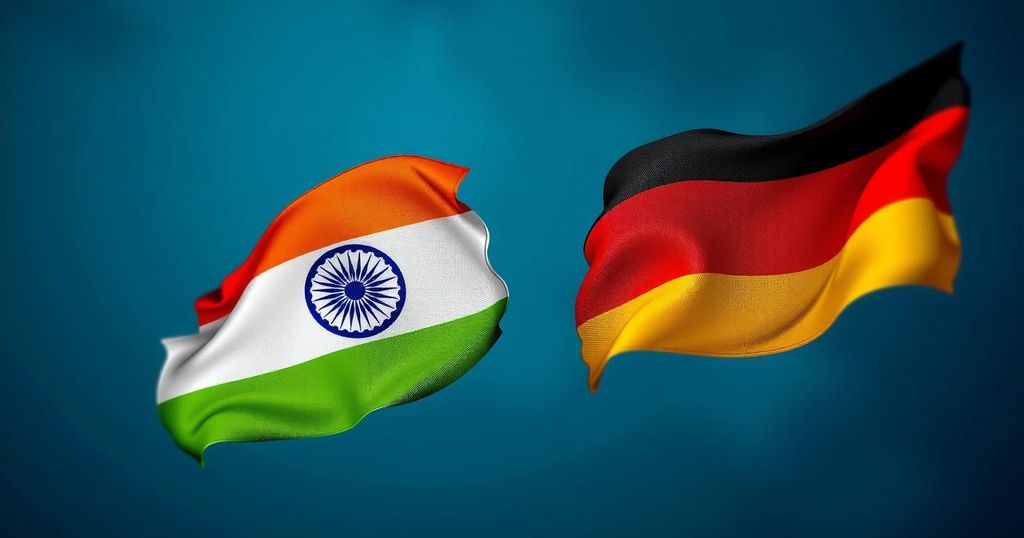Germany Invests in India to Decrease Dependence on China
Germany is reassessing its economic strategies by focusing on India to mitigate reliance on China. Chancellor Olaf Scholz’s delegation aims to enhance investments in India, as German firms express optimism about growth in the Indian market despite challenges. With significant skilled labor and lower costs, India is increasingly viewed as a viable alternative for German companies. Trade has reached record levels, yet obstacles remain in establishing a strong foothold in the market.
Chancellor Olaf Scholz is leading a significant delegation to New Delhi, as Germany seeks to strengthen its economic ties with India in a bid to diminish its dependence on China. German enterprises are optimistic about India’s potential for growth, due to its abundant skilled labor, lower operational costs, and a robust economy expanding at approximately 7%. This diplomatic mission comes during a critical period for Germany, facing economic contraction and potential fallout from trade tensions with China, which may adversely impact German industries. In response to past vulnerabilities, particularly the dependency on Russian gas prior to the conflict in Ukraine in 2022, Germany has adopted a ‘de-risking’ approach to lessen its reliance on China. Despite this shift, China remains a dominant player in the global market. In 2022, German investments in India reached around 25 billion euros, only 20% of their investments in China, but projections by Volker Treier of the German Chamber of Commerce suggest that this could rise to 40% by 2030. Scholz’s visit includes discussions with Prime Minister Narendra Modi and a seventh round of Indian-German government consultations, signifying the importance of this partnership. It is clear that while Indian bureaucracy and tax policies pose challenges for investors, a significant percentage of German businesses still anticipate revenue growth in the Indian market over the next five years. Prominent companies such as DHL and Volkswagen are already capitalizing on this opportunity, with DHL planning substantial investments in India’s burgeoning e-commerce sector. Moreover, Volkswagen is exploring joint ventures in India to bolster its production capabilities in response to declining sales in China. A similar sentiment is echoed by engine manufacturer Deutz, which is set to collaborate with Indian firm TAFE for engine production. Trade relations between India and Germany reached new highs in 2023, with India projected to emerge as one of the largest economies globally by the end of this decade. However, the path toward a comprehensive EU-India free trade agreement remains fraught with uncertainty. Essentially, while the challenges are considerable to secure a foothold in the Indian market, the prospects for growth and expansion are undeniably compelling for German enterprises.
The article discusses Germany’s strategic pivot towards India as part of a broader economic realignment aimed at reducing reliance on China. This shift is particularly relevant in the context of recent geopolitical tensions and economic challenges faced by Germany, including the potential fallout from trade disputes with China and the impact of the Ukraine conflict on energy dependencies. The article highlights the optimism of German businesses regarding India’s growth potential, emphasizing the favorable economic conditions and demographic advantages it presents. Furthermore, it provides insights into the existing investment landscape and the prospects for future growth, illustrating the dynamics of international trade relations between Germany and India.
In summary, Germany’s increasing focus on India represents a strategic effort to diversify its economic partnerships and lessen dependency on China amidst a challenging global landscape. With strong investment intentions, a growing trade relationship, and a shared vision for future cooperation, both nations stand to benefit significantly. However, the pathway to achieving this potential is complicated by various hurdles, including bureaucratic challenges and the necessity for substantial investment strategies. As Germany navigates these complexities, the outcome of this initiative will be key in shaping its economic future.
Original Source: www.usnews.com







Post Comment